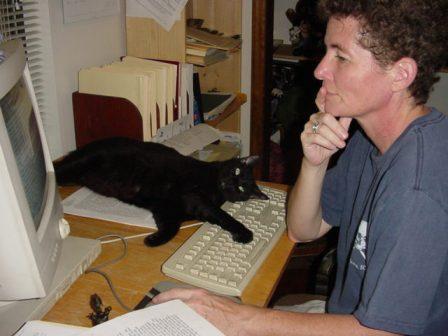Your Money at Work-Scientific Study Backed With Federal Dollars

The following scientific paper detailing a federally funded study typifies the workings of the scientific community when dependant solely on grants and the vagaries of the political system. We offer it to you for perusal and reaction.
Euroswydd, Reiki Clown and Mort
Your Money at Work- A Scientific Study Backed with Federal Dollars
“You Can’t Teach an Old Dog New Tricks”… or Can You?
Abstract:
This two year study of a middle aged female humanoid proved beyond a shadow of a doubt that behavior can be modified and physical acuity sharpened even during “the declining years” as that time period is so descriptively labeled.
The subject of this analysis arrived at the testing site in March of 2004 and endured cohabitation with millions of medium sized mosquitoes with particular intensity being observed during the months of October through April. While unable to successfully capture her quarry in 2004 a marked improvement in her abilities was noted by the behaviorists during the 2005 season.
Introduction:
The objective of this study was to validate or negate the long standing hypothesis that “you can’t teach an old dog new tricks”. Deeming acquisition of this knowledge to be a priority the Federal Government appropriated several million dollars to close the book on this pressing issue once and for all.
The subject was a forty-seven year old female transplanted from the Northeast coast of the United States to the year round hot, humid climate that is the Florida Panhandle. Prevailing conclusions have pointed to the impossibility of such a woman being able to regain the lightning fast reflexes (associated with more youthful acuity) needed to protect herself and her family from the hoards of savage mosquitoes constantly seeking nourishment.
Reaching particularly intensity during the months of October through April they regularly invaded the woman’s domicile. A direct link between air condition usage and mosquito entry has been documented as a direct result of this study.
Within this laboratory we spent two years watching to see whether this middle-aged female humanoid’s reaction time, when trying to swat at the offending creatures, could increase.
Materials and Methods
Our materials encompass the housing shell, forty-seven year old female subject, insects, time and gallons of insect repellant.
Results
There was a marked increase in speed and acuity from the first year of inundation to the second. While our subject rarely hit her target, (the mosquito) in the first year of observation but by the same time in October 2005, she’d reached an average of nearly 100% annihilation per attempt. We conclude unequivocally that in spite of the stereotyping surrounding the slowing, stiffening and lowered physical stamina attributed to the aging process that given enough impetus a humanoid can reverse or at least stem the process to their own advantage.
A direct correlation was noted between the cool atmosphere as created by incessantly running air conditioners during the ‘summer’ months and their absence in the ‘winter’ months in relation to mosquito presence within the house. Mosquitoes like it warm and will get into the house when it’s warmer than air outside, no matter what measures are employed.
Discussion
We reached our conclusions based on the fact that unused to having to swat and connect with mosquitoes with any regularity in the first forty-five years of her life (she was after all forty-six the first year of the study) necessity brought about a rapid, development of the skills appropriate for survival in this alien environment. To quote our subject, “I never in my wildest imagination, would have considered the development of killer hands necessary to add to my arsenal of survival skills. These suckers-and I say that with conscious intent-are the bane of my existence. I’m so happy for the government that they now know that we aging humanoids can indeed adapt and learn. When can we expect to see any positive changes in political policy or programs based on this information?”
We are next considering a study clarifying sense of humor and irony.
 Available At:
Available At:


<< Home